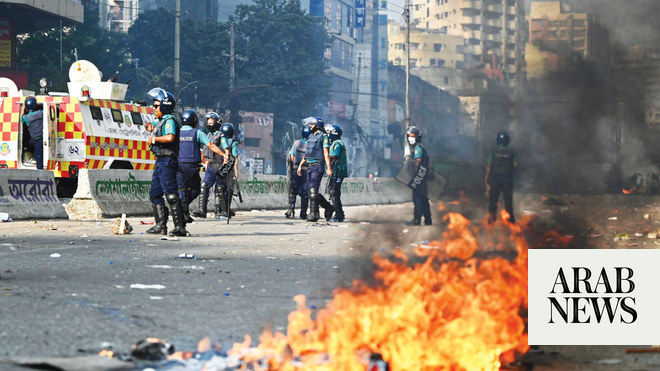
Bangladesh’s opposition parties, including the major Bangladesh Nationalist Party (BNP), join hands ahead of general elections
The success of the new political alliance will mostly depend on how it attracts the ‘floating voters’, experts say
DHAKA: Politics in Bangladesh took a new turn with the emergence of the new opposition parties" alliance “Jatiya Oikya Front” or the National Unity Front.
The alliance forged amid four political parties singles out the Bikolpo Dhara Bangladesh party of Dr. Badruddoja Chowdhury.
Bangladesh Nationalist Party (BNP), the largest political opposition of the country, is also part of the National Unity Front led by eminent jurist Dr. Kamal Hossain.
The BNP, the core partner of the alliance, terms the process a “strategic” move and invites all political parties to join under the umbrella of the National Unity Front to hold a “credible election and change the present regime.”
In order to hold a free, fair and inclusive general election the alliance has put forward its seven-point demand, which includes the dissolution of the parliament after the resignation of the incumbent government and a formation of a nonpartisan election period government through mutual consultations with all political parties. The demand also includes ensuring a level playing field for all the parties, reformation of the present Election Commission, and deployment of the army with magistracy power during the election period.
The alliance has declared its 11-point agenda, asserting its determination with a view to establishing good governance by bringing a balance of power in parliament and government to build a Bangladesh with the spirit of the Liberation War to end the "authoritarian regime," and decentralize the administration.
Shortly after the emergence of the new alliance on Saturday, Dr. Chowdhury, president of the BDB, said his party would not join the coalition so it can help the BNP to form the next government.
Justifying the decision to leave the alliance, Mahi B. Chowdhury, Joint Secretary General of the BDB, said: “In the name of unity, an anti-state conspiracy is going on and we can’t be a part of it.”
The split at the outset of the new alliance reveals a conflict of interest among the political groups which created concern among the political observers of the country.
Advocate Ahmed Azam Khan, vice chairperson of the BNP, told Arab News: “The activities of this united platform will lead the country to hold a credible election.”
The BNP heads another political alliance of 20 small parties including Jamat-e-Islami Bangladesh, which opposed the county’s independence during the Liberation War of 1971.
“In the new alliance, the BNP has joined as a single political entity and has no relationship with our previous alliances and politics,” added Khan.
Initially, there was a strong voice among the initiators of the National Unity Front demanding that the BNP discard its long-term political ally Jamat-e-Islami to float with the alliance, although the BNP has not yet declared anything officially in this regard.
Political analysts and experts consider this alliance a way of consolidating the opposition’s strength to win the election race.
“I don’t see anything wrong here. Such type of alliances were seen in many countries before the election. What this alliance will ultimately achieve and how they determine the election road map will become clearer in the next few weeks when the election schedule is declared by the election commission,” said Naimul Islam Khan, a veteran journalist and editor of Bangla Daily Amader Notun Shomoy.
“However we still don’t know the election strategy of the ruling Awami League party. But definitely the emergence of the new political alliance is a significant inclusion in the country’s election race,” Khan added.
He said the success of the alliance will mostly depend on how the BNP can attract the sympathy of the “floating voters” and encash it during the vote.
Professor A. S. M. Amanullah, a professor at Dhaka University, told Arab News: “Apart from BNP, the small-print parties of the alliance have very little impact on the country’s political arena. If they can run together with the BNP alliance successfully, it will definitely empower them in the election and get them good bargaining in the political field.”
However, he is still doubtful about the “sustainability” of this new alliance.
“Since the leaders from varied opinions formed this alliance, it will be very difficult to hold it under one umbrella. But if they sustain for a longer period, they will definitely turn up as a strong competitor for the Awami League in the forthcoming elections,” Amanullah said.












